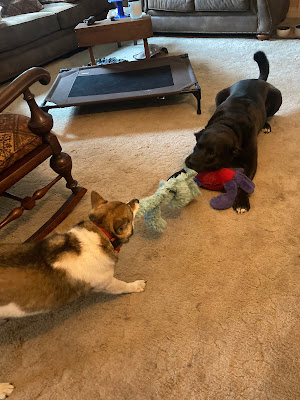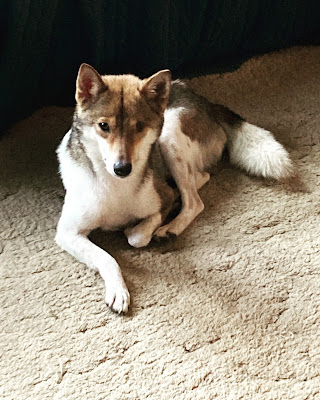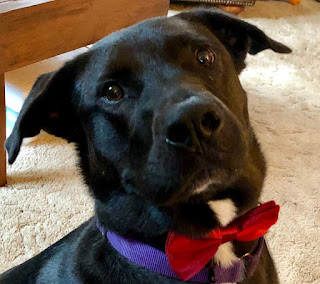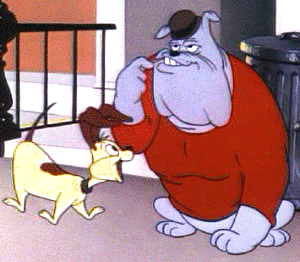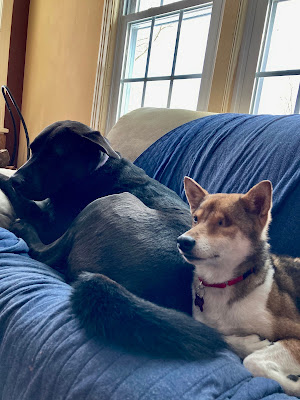When we lost our beloved old hound Lena in November, I really had no intention of getting another dog, at least not any time soon. I went through the feelings of "I can't face going through this again" all grieving pet owners experience. But then we started noticing that our other dog, a big galumphing galoot of a pittie mix named Guinness, was sliding into a serious depression. He and Lena had been good buddies, and he was having a hard time adjusting to suddenly being an Only Dog for the first time in his life.
So Carol and I started perusing the wonderful site PetFinder, which pulls together listings for adoptable pets, sorted by whatever parameters you like -- breed, age, sex, temperament, proximity to your location, and so forth. We wanted someone who would be a good companion for Guinness as well as ourselves, and initially thought another pittie mix would be a good choice (despite several friends voicing the sentiment, "Are you insane? You don't have enough trouble with one?").
And the shelters have lots of pittie mixes. Whether this is because of their largely-undeserved bad reputation or simply because they're common, I have no idea. But we had our minds open -- the one firm criterion was compatibility with us and with Guinness.
That was how we stumbled on a listing for a little Shiba Inu rescue only an hour from where we live. She had a sad backstory -- I suppose most dogs in shelters and rescues do -- she'd been used as breeding stock by a guy for whom the word "unscrupulous" is altogether too kind, and because of an injury and subsequent neglect, she was missing her left eye. Despite this, the listing said she was sweet, friendly, curious, and intelligent -- and, best of all, loved other dogs.
So we put in an application with the wonderful non-profit rescue organization Home Stretch Dog Haven, of Moravia, New York, letting them know that the whole thing was contingent on getting along with Guinness, who (and I say this with all due love and affection) can be a little weird at times. (When I talked to the owner of Home Stretch, she said the dog we were considering "didn't have any quirks." My comment to Carol was, "yeah? Wait till she's lived with us for a couple of months." We've owned a lot of dogs, and none of them could be described as "not quirky," even the ones who kind of started out that way. What that says about us as pet owners I'll leave you to decide.)
Anyhow, after passing the vetting process, the owner of Home Stretch invited us up this past Sunday to meet her.
My first thought upon seeing her was, "Holy smoke, she's tiny." I've always had big-ish dogs -- not as big as our friends Wendy and Renée, who seem to specialize in Mastiffs and Great Danes, but still not what you'd usually think of as a lap dog. (No one has explained this distinction to Guinness, who at thirty kilograms still thinks he's a lap dog, despite being more of a lap-and-a-half dog.) But this little dog only weighs a little over ten kilograms. At first glance, my impression was that her whole head was about the size of Guinness's paw. But maybe, I thought, it'd be nice to finally have a Port-a-Dog, who if they're misbehaving, you can just pick them up and move them, unlike Guinness, who when he sets his mind on something, is like trying to tow a Sherman tank.
Well, the long-and-short of it is that they got along fine, and after a long, chilly walk in the fields behind the rescue facility, we wrote a check for the adoption and put Guinness and his new friend into the car for the ride home.
So, dear world... meet Cleo.
Such dog. Much cute. Many fuzzy. So happy. Wow.
She was a little nervous at first, but the evening we got her, she and Guinness were already chasing each other around the living room (the contrast between her quick, lithe, dance-like movements and Guinness's bull-in-a-china-shop approach is laugh-out-loud funny). "Shiba Inu" is Japanese for "underbrush dog," apparently because their small size and agility make them useful for hunting in overgrown areas. It was only after we got home, though, that Carol did
some research on the breed, and sent me the following:
Some breeds are more difficult to train than others and the Shiba Inu is considered one of the most difficult breeds to train. People fall in love with the “fox” look of the Shiba Inu but are not prepared to deal with their larger than life and stubborn personality. Shiba Inus will only respond to activities that make sense to them and are very strong-willed and stubborn. They will fight back if feeling threatened and will not back down once they have their mind set on something. Shibas have a singular state of mind and once they focus on something, they become obsessed and giving up is not an option. A Shiba will be willing to not eat, not get attention, not go on walks, and much more if they feel their pride is on the line.
My response to this was, "... oh."
No quirks, my ass.
In any case, Cleo is settling right in, and fortunately, we're no strangers to dogs with behavioral difficulties. We've had a neurotic border collie who herded everything including our cats, a (very) mixed breed who was sweet and lovable but an absolute unholy terror at the vet, a hound who was so rambunctious that Carol's doctor saw her bruised arms and legs and asked if her husband was abusing her, and (of course) Guinness, who has richly earned his nickname of El Destructo. And there's no doubt that after her rough first four years, she needed a warm, secure home with people who will love her no matter what.
Which is what she's found. As I write this, she's curled up in my lap. It's a little hard to write with a dog draped over your arm, but I'm managing. I obviously can't ask her to move. Wouldn't want to injure her pride, you know.
****************************************
I remember when I first learned about the tragedy of how much classical literature has been lost. Take, for example, Sophocles, which anyone who's taken a college lit class probably knows because of his plays Oedipus Rex, Antigone, and Oedipus at Colonus. He was the author of at least 120 plays, of which only seven have survived. While we consider him to be one of the most brilliant ancient Greek playwrights, we don't even have ten percent of the literature he wrote. As Carl Sagan put it, it's as if all we had of Shakespeare was Timon of Athens, The Merry Wives of Windsor, and Cymbeline, and were judging his talent based upon that.
The same is true of just about every classical Greek and Roman writer. Little to nothing of their work survives; some are only known because of references to their writing in other authors. Some of what we do have was saved by fortunate chance; this is the subject of Stephen Greenblatt's wonderful book The Swerve, which is about how a fifteenth-century book collector, Poggio Bracciolini, discovered in a monastic library what might well have been the sole remaining copy of Lucretius's masterwork De Rerum Natura (On the Nature of Things), which was one of the first pieces of writing to take seriously Democritus's idea that all matter is made of atoms.
The Swerve looks at the history of Lucretius's work (and its origin in the philosophy of Epicurus) and the monastic tradition that allowed it to survive, as well as Poggio's own life and times and how his discovery altered the course of our pursuit of natural history. (This is the "swerve" referenced in the title.) It's a fascinating read for anyone who enjoys history or science (or the history of science). His writing is clear, lucid, and quick-paced, about as far from the stereotype of historical writing being dry and boring as you could get. You definitely need to put this one on your to-read list.
[Note: if you purchase this book using the image/link below, part of the proceeds goes to support Skeptophilia!]









